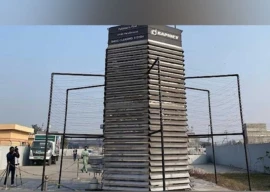
The government is considering levying a special surcharge, endorsed by the International Monetary Fund, on all dutiable items, including essential ones, at a rate of five per cent. According to a study carried out by the ministry of finance, if the surcharge on dutiable imports is levied from October 1 onwards, it would generate an additional Rs74.1 billion till June 30 next year.
“The most worrisome aspect of the five per cent additional tax on dutiable imports is its significant inflationary impact,” said Dr Hafeez Pasha, Chairman Revenue Advisory Council and former minister of finance.
According to calculations conducted by the ministry of finance, inflation may shoot to 25 per cent in coming months due to disruptions in the supply chain of necessities and soaring demand for construction material. This study does not include the impact of five per cent surcharge.
“The economy does not have the strength to bear the burden of another surcharge. It would be very bad for the economy,” added Dr Pasha.
“What the government should do is to exempt essential items like fertiliser, wheat, pulses, petroleum products, edible oil and medicines from this special surcharge,” he added.
Dr Pasha also said that the surcharge would adversely impact importers of raw material. However, it will provide protection to an industry that sells finished products as the surcharge will make imports expensive and provide an edge to the local industry.
Presently, the average import duty rate is 11 per cent which would increase to 16 per cent after the surcharge and may severely affect inflation. The government would collect an additional $500 million on only petroleum products as the annual import bill hovers around $10 billion.
The flood surcharge would immediately increase petroleum product prices by at least 10 per cent as the price will be calculated by taking into account all payable duties.
Dr Pasha criticised the government policy of collecting money by levying an additional surcharge. “The federal and provincial governments should cut their development budgets by 25 per cent as this move alone could save over Rs150 billion, which is much more than the expected revenue from the flood relief surcharge.”
In addition to importing advanced machinery, Pakistan also imports various raw materials, reprocesses them in local industries and then exports finished products.
The raw materials which Pakistan imports, utilises and then exports mainly include raw cotton, synthetic fibre, silk yarn, fertiliser, insecticide, plastic material, iron and steel, scrap and other chemical products. The range of raw materials shows how broadly a surcharge would affect consumers across different sectors.
“Any move to slap a special flood surcharge will negatively affect the textile and engineering industries the most,” says Sultan Burk, an individual who imports zinc as raw material. Burk said that if the government levies this surcharge, it would become very difficult for him to run his factory.
He added that in such a case he would prefer to import the finished products from China, as those would be cheaper than producing the goods locally.
The business community wants to help the flood victims but has shied away from giving money through the government. It is sceptical of the transparent use of money and worried about any negative impact of the surcharge on the industry.
Islamabad Chamber of Commerce and Industry Chairman Zahid Maqbool also opposed the idea of levying any form of flood surcharge on imports. “Any such move would fuel inflation and above all no one was sure about the fair use of money,” he said.
Instead, he suggested the idea that the government could levy a fixed surcharge of up to Rs2,000 on services rendered by the state. “In order to ensure transparency the amount should be pooled in a flood relief fund so that it can be duly audited,” he said.
All Pakistan Car Dealers Chairman HM Shahzad is currently operating a relief camp in a remote Sindh town but he is reluctant to donate money through the government. In addition to transparency issues, he was also apprehensive about the fallout of the surcharge on the import of used cars.
“Since 2008, import duties on cars have increased dramatically by 265 per cent and the likely imposition of 5 per cent flood surcharge would actually result in a 25 per cent increase in prices of cars as the price would be charged after calculating all import duties.”
Shahzad said that the surcharge would also result in shrinking car imports and would also strengthen the position of local car manufacturers who will find more avenues to exploit consumers. “The government is not working in areas where it can actually get more money,” he said, adding that instead of slapping the surcharge at the import stage the government should think of increasing road vehicle tax and registration fee for new cars.
However, Planning Commission Deputy Chairman Dr Nadeem ul Haq remained a strong proponent of the flood surcharge. He said that people, irrespective of their affiliations, should come out to help their countrymen. He said that the surcharge would not affect the industry much.
Published in The Express Tribune September 9th, 2010.
1736502202-0/fizza-(3)1736502202-0-405x300.webp)

1736498370-0/Untitled-design-(25)1736498370-0-165x106.webp)
1736496818-0/Untitled-design-(24)1736496818-0-165x106.webp)
1736495349-0/Untitled-design-(22)1736495349-0-165x106.webp)
1736498386-0/Express-Tribune---News-Desk-(6)1736498386-0-270x192.webp)






1736332856-0/Untitled-design-(20)1736332856-0-270x192.webp)



1736334465-0/sidra--(45)1736334465-0-270x192.webp)






COMMENTS (2)
Comments are moderated and generally will be posted if they are on-topic and not abusive.
For more information, please see our Comments FAQ